- Home
- Isabel Allende
The House of the Spirits Page 2
The House of the Spirits Read online
Page 2
Just at that moment, as Nívea would recall years later, in the midst of all that anxiety and silence, the voice of little Clara was heard in all its purity.
“Psst! Father Restrepo! If that story about hell is a lie, we’re all fucked, aren’t we. . . .”
The Jesuit’s index finger, which was already raised to illustrate additional tortures, remained suspended like a lightning rod above his head. People stopped breathing, and those whose heads had been nodding suddenly woke up. Señor and Señora del Valle were the first to react. They were swept by panic as they saw their children fidget nervously. Severo understood that he must act before collective laughter broke out around them or some divine cataclysm occurred. He grabbed his wife by the arm and Clara by the neck and walked out dragging them behind him with enormous strides, followed by his other children, who stampeded toward the door. They managed to escape before the priest could summon a ray of lightning to turn them all into pillars of salt, but from the threshold they could hear his dreadful voice of offended archangel.
“Possessed . . . She’s possessed by the devil!”
These words of Father Restrepo were etched in the family memory with all the gravity of a diagnosis, and in the years to come they had more than one occasion to recall them. The only one who never thought of them again was Clara herself, who simply wrote them in her diary and forgot them. Her parents, however, could not forget, even though they both agreed that demonic possession was a sin too great for such a tiny child. They were afraid of other people’s curses and Father Restrepo’s fanaticism. Until that day they had never given a name to the eccentricities of their youngest daughter, nor had it ever crossed their minds to ascribe them to satanic influence. Clara’s strangeness was simply an attribute of their youngest daughter, like Luis’s limp or Rosa’s beauty. The child’s mental powers bothered no one and produced no great disorder; they almost always surfaced in matters of minor importance and within the strict confines of their home. It was true there had been times, just as they were about to sit down to dinner and everyone was in the large dining room, seated according to dignity and position, when the saltcellar would suddenly begin to shake and move among the plates and goblets without any visible source of energy or sign of illusionist’s trick. Nívea would pull Clara’s braids and that would be enough to wake her daughter from her mad distraction and return the saltcellar to immobility. The other children had organized a system so that in case of visitors, whoever was closest would reach out and stop whatever might be moving on the table before the guests noticed and were startled. The family continued eating without comment. They had also grown accustomed to the youngest daughter’s prophecies. She would announce earthquakes in advance, which was quite useful in that country of catastrophes, for it gave them a chance to lock up the good dishes and place their slippers within reach in case they had to run out in the middle of the night. At the age of six, Clara had foreseen that the horse was going to throw Luis, but he refused to listen and had had a dislocated hip ever since. In time, his left leg had shortened and he had to wear a special shoe with an enormous platform that he made himself. After that Nívea had worried, but Nana reassured her by telling her that many children fly like birds, guess other people’s dreams, and speak with ghosts, but that they all outgrow it when they lose their innocence.
“None of them reach adulthood like that,” she explained. “Wait till she starts to ‘demonstrate.’ You’ll see how fast she loses interest in making furniture move across the room and predicting disasters!”
Clara was Nana’s pet. She had helped at her birth and was the only one who really understood the child’s eccentricities. When Clara had emerged from her mother’s womb, Nana had cradled and washed her, and from that time on she had felt a desperate love for this fragile creature whose lungs were always full of phlegm, who was always on the verge of losing her breath and turning purple, and whom she had had to revive so many times with the warmth of her huge breasts because she knew that this was the only cure for asthma, much more effective than Dr. Cuevas’s fortified syrups.
On that particular Holy Thursday, Severo was pacing up and down the drawing room worrying about the scandal his daughter had provoked at mass. He reasoned that only a fanatic like Father Restrepo could believe in satanic possession in the heart of the twentieth century, this century of light, science, and technology, a time in which the devil had finally lost his reputation. Nívea interrupted him to say that was not the point. The seriousness of what had happened was that if word of their daughter’s powers reached beyond the walls of the house and the priest began his own investigation, all their neighbors would find out.
“People are going to start lining up to look at her as if she were a monster,” Nívea said.
“And the Liberal Party will go to hell,” Severo added, anticipating the damage to his political career that could be caused by having a bewitched child in the family.
Just then Nana shuffled in with her sandals flapping, in her froufrou of starchy petticoats, to announce that a group of men were out in the courtyard unloading a dead man. And so they were. A four-horse carriage had drawn up outside occupying the whole first courtyard, trampling the camellias, and getting manure all over the shiny cobblestones, all this amidst a whirlwind of dust, a pawing of horses, and the curses of superstitious men who were gesticulating against the evil eye. They had come to deliver the body of Uncle Marcos and all his possessions. A honey-voiced man dressed in black, with a frock coat and a hat that was too big for him, was directing the tumult. He began a solemn speech explaining the circumstances of the case, but was brutally interrupted by Nívea, who threw herself on the dusty coffin that held the remains of her dearest brother. She was shouting for them to lift the cover so she could see him with her own two eyes. She had buried him once before, which explained why she had room for doubt whether this time his death was real. Her shouts brought the servants streaming from the house, as well as all her children, who came as fast as they could when they heard their uncle’s name echoing amidst the cries of mourning.
It had been two years since Clara had last seen her Uncle Marcos, but she remembered him very well. His was the only perfectly clear image she retained from her whole childhood, and in order to describe him she did not need to consult the daguerreotype in the drawing room that showed him dressed as an explorer leaning on an old-fashioned double-barreled rifle with his right foot on the neck of a Malaysian tiger, the same triumphant position in which she had seen the Virgin standing between plaster clouds and pallid angels at the main altar, one foot on the vanquished devil. All Clara had to do to see her uncle was close her eyes and there he was, weather-beaten and thin, with a pirate’s mustache through which his strange, sharklike smile peered out at her. It seemed impossible that he could be inside that long black box that was lying in the middle of the courtyard.
Each time Uncle Marcos had visited his sister Nívea’s home, he had stayed for several months, to the immense joy of his nieces and nephews, particularly Clara, causing a storm in which the sharp lines of domestic order blurred. The house became a clutter of trunks, of animals in jars of formaldehyde, of Indian lances and sailor’s bundles. In every part of the house people kept tripping over his equipment, and all sorts of unfamiliar animals appeared that had traveled from remote lands only to meet their death beneath Nana’s irate broom in the farthest corners of the house. Uncle Marcos’s manners were those of a cannibal, as Severo put it. He spent the whole night making incomprehensible movements in the drawing room; later they turned out to be exercises designed to perfect the mind’s control over the body and to improve digestion. He performed alchemy experiments in the kitchen, filling the house with fetid smoke and ruining pots and pans with solid substances that stuck to their bottoms and were impossible to remove. While the rest of the household tried to sleep, he dragged his suitcases up and down the halls, practiced making strange, high-pitched sounds on savage instruments, and taught
Spanish to a parrot whose native language was an Amazonic dialect. During the day, he slept in a hammock that he had strung between two columns in the hall, wearing only a loincloth that put Severo in a terrible mood but that Nívea forgave because Marcos had convinced her that it was the same costume in which Jesus of Nazareth had preached. Clara remembered perfectly, even though she had been only a tiny child, the first time her Uncle Marcos came to the house after one of his voyages. He settled in as if he planned to stay forever. After a short time, bored with having to appear at ladies’ gatherings where the mistress of the house played the piano, with playing cards, and with dodging all his relatives’ pressures to pull himself together and take a job as a clerk in Severo del Valle’s law practice, he bought a barrel organ and took to the streets with the hope of seducing his Cousin Antonieta and entertaining the public in the bargain. The machine was just a rusty box with wheels, but he painted it with seafaring designs and gave it a fake ship’s smokestack. It ended up looking like a coal stove. The organ played either a military march or a waltz, and in between turns of the handle the parrot, who had managed to learn Spanish although he had not lost his foreign accent, would draw a crowd with his piercing shrieks. He also plucked slips of paper from a box with his beak, by way of selling fortunes to the curious. The little pink, green, and blue papers were so clever that they always divulged the exact secret wishes of the customers. Besides fortunes there were little balls of sawdust to amuse the children and a special powder that was supposed to cure impotence, which Marcos sold under his breath to passersby afflicted with that malady. The idea of the organ was a last desperate attempt to win the hand of Cousin Antonieta after more conventional means of courting her had failed. Marcos thought no woman in her right mind could remain impassive before a barrel-organ serenade. He stood beneath her window one evening and played his military march and his waltz just as she was taking tea with a group of female friends. Antonieta did not realize the music was meant for her until the parrot called her by her full name, at which point she appeared in the window. Her reaction was not what her suitor had hoped for. Her friends offered to spread the news to every salon in the city, and the next day people thronged the downtown streets hoping to see Severo del Valle’s brother-in-law playing the organ and selling little sawdust balls with a moth-eaten parrot, for the sheer pleasure of proving that even in the best of families there could be good reason for embarrassment. In the face of this stain to the family reputation, Marcos was forced to give up organ-grinding and resort to less conspicuous ways of winning over his Cousin Antonieta, but he did not renounce his goal. In any case, he did not succeed, because from one day to the next the young lady married a diplomat who was twenty years her senior; he took her to live in a tropical country whose name no one could recall, except that it suggested negritude, bananas, and palm trees, where she managed to recover from the memory of that suitor who had ruined her seventeenth year with his military march and his waltz. Marcos sank into a deep depression that lasted two or three days, at the end of which he announced that he would never marry and that he was embarking on a trip around the world. He sold his organ to a blind man and left the parrot to Clara, but Nana secretly poisoned it with an overdose of cod-liver oil, because no one could stand its lusty glance, its fleas, and its harsh, tuneless hawking of paper fortunes, sawdust balls, and powders for impotence.
That was Marcos’s longest trip. He returned with a shipment of enormous boxes that were piled in the far courtyard, between the chicken coop and the woodshed, until the winter was over. At the first signs of spring he had them transferred to the parade grounds, a huge park where people would gather to watch the soldiers file by on Independence Day, with the goose step they had learned from the Prussians. When the crates were opened, they were found to contain loose bits of wood, metal, and painted cloth. Marcos spent two weeks assembling the contents according to an instruction manual written in English, which he was able to decipher thanks to his invincible imagination and a small dictionary. When the job was finished, it turned out to be a bird of prehistoric dimensions, with the face of a furious eagle, wings that moved, and a propeller on its back. It caused an uproar. The families of the oligarchy forgot all about the barrel organ, and Marcos became the star attraction of the season. People took Sunday outings to see the bird; souvenir vendors and strolling photographers made a fortune. Nonetheless, the public’s interest quickly waned. But then Marcos announced that as soon as the weather cleared he planned to take off in his bird and cross the mountain range. The news spread, making this the most talked-about event of the year. The contraption lay with its stomach on terra firma, heavy and sluggish and looking more like a wounded duck than like one of those newfangled airplanes they were starting to produce in the United States. There was nothing in its appearance to suggest that it could move, much less take flight across the snowy peaks. Journalists and the curious flocked to see it. Marcos smiled his immutable smile before the avalanche of questions and posed for photographers without offering the least technical or scientific explanation of how he hoped to carry out his plan. People came from the provinces to see the sight. Forty years later his great-nephew Nicolás, whom Marcos did not live to see, unearthed the desire to fly that had always existed in the men of his lineage. Nicolás was interested in doing it for commercial reasons, in a gigantic hot-air sausage on which would be printed an advertisement for carbonated drinks. But when Marcos announced his plane trip, no one believed that his contraption could be put to any practical use. The appointed day dawned full of clouds, but so many people had turned out that Marcos did not want to disappoint them. He showed up punctually at the appointed spot and did not once look up at the sky, which was growing darker and darker with thick gray clouds. The astonished crowd filled all the nearby streets, perching on rooftops and the balconies of the nearest houses and squeezing into the park. No political gathering managed to attract so many people until half a century later, when the first Marxist candidate attempted, through strictly democratic channels, to become President. Clara would remember this holiday as long as she lived. People dressed in their spring best, thereby getting a step ahead of the official opening of the season, the men in white linen suits and the ladies in the Italian straw hats that were all the rage that year. Groups of elementary-school children paraded with their teachers, clutching flowers for the hero. Marcos accepted their bouquets and joked that they might as well hold on to them and wait for him to crash, so they could take them directly to his funeral. The bishop himself, accompanied by two incense bearers, appeared to bless the bird without having been asked, and the police band played happy, unpretentious music that pleased everyone. The police, on horseback and carrying lances, had trouble keeping the crowds far enough away from the center of the park, where Marcos waited dressed in mechanic’s overalls, with huge racer’s goggles and an explorer’s helmet. He was also equipped with a compass, a telescope, and several strange maps that he had traced himself based on various theories of Leonardo da Vinci and on the polar knowledge of the Incas. Against all logic, on the second try the bird lifted off without mishap and with a certain elegance, accompanied by the creaking of its skeleton and the roar of its motor. It rose flapping its wings and disappeared into the clouds, to a send-off of applause, whistlings, handkerchiefs, drumrolls, and the sprinkling of holy water. All that remained on earth were the comments of the amazed crowd below and a multitude of experts, who attempted to provide a reasonable explanation of the miracle. Clara continued to stare at the sky long after her uncle had become invisible. She thought she saw him ten minutes later, but it was only a migrating sparrow. After three days the initial euphoria that had accompanied the first airplane flight in the country died down and no one gave the episode another thought, except for Clara, who continued to peer at the horizon.
After a week with no word from the flying uncle, people began to speculate that he had gone so high that he had disappeared into outer space, and the ignorant suggested he would reach
the moon. With a mixture of sadness and relief, Severo decided that his brother-in-law and his machine must have fallen into some hidden crevice of the cordillera, where they would never be found. Nívea wept disconsolately and lit candles to San Antonio, patron of lost objects. Severo opposed the idea of having masses said, because he did not believe in them as a way of getting into heaven, much less of returning to earth, and he maintained that masses and religious vows, like the selling of indulgences, images, and scapulars, were a dishonest business. Because of his attitude, Nívea and Nana had the children say the rosary behind their father’s back for nine days. Meanwhile, groups of volunteer explorers and mountain climbers tirelessly searched peaks and passes, combing every accessible stretch of land until they finally returned in triumph to hand the family the mortal remains of the deceased in a sealed black coffin. The intrepid traveler was laid to rest in a grandiose funeral. His death made him a hero and his name was on the front page of all the papers for several days. The same multitude that had gathered to see him off the day he flew away in his bird paraded past his coffin. The entire family wept as befit the occasion, except for Clara, who continued to watch the sky with the patience of an astronomer. One week after he had been buried, Uncle Marcos, a bright smile playing behind his pirate’s mustache, appeared in person in the doorway of Nívea and Severo del Valle’s house. Thanks to the surreptitious prayers of the women and children, as he himself admitted, he was alive and well and in full possession of his faculties, including his sense of humor. Despite the noble lineage of his aerial maps, the flight had been a failure. He had lost his airplane and had to return on foot, but he had not broken any bones and his adventurous spirit was intact. This confirmed the family’s eternal devotion to San Antonio, but was not taken as a warning by future generations, who also tried to fly, although by different means. Legally, however, Marcos was a corpse. Severo del Valle was obliged to use all his legal ingenuity to bring his brother-in-law back to life and the full rights of citizenship. When the coffin was pried open in the presence of the appropriate authorities, it was found to contain a bag of sand. This discovery ruined the reputation, up till then untarnished, of the volunteer explorers and mountain climbers, who from that day on were considered little better than a pack of bandits.

 The Stories of Eva Luna
The Stories of Eva Luna The House of the Spirits
The House of the Spirits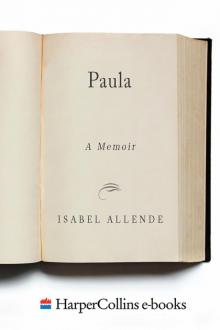 Paula
Paula Ines of My Soul
Ines of My Soul Of Love and Shadows
Of Love and Shadows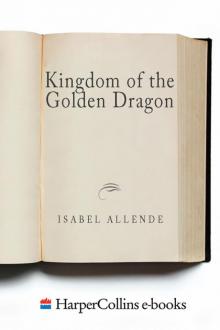 Kingdom of the Golden Dragon
Kingdom of the Golden Dragon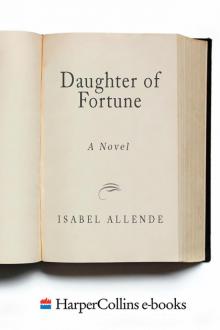 Daughter of Fortune
Daughter of Fortune City of the Beasts
City of the Beasts Maya's Notebook
Maya's Notebook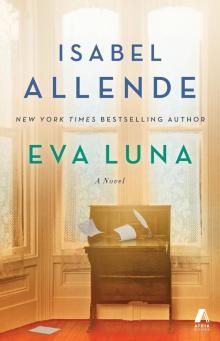 Eva Luna
Eva Luna Zorro
Zorro In the Midst of Winter
In the Midst of Winter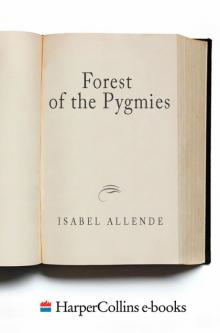 Forest of the Pygmies
Forest of the Pygmies My Invented Country: A Nostalgic Journey Through Chile
My Invented Country: A Nostalgic Journey Through Chile The Japanese Lover
The Japanese Lover Portrait in Sepia
Portrait in Sepia Island Beneath the Sea
Island Beneath the Sea The Soul of a Woman
The Soul of a Woman A Long Petal of the Sea
A Long Petal of the Sea Ines of My Soul: A Novel
Ines of My Soul: A Novel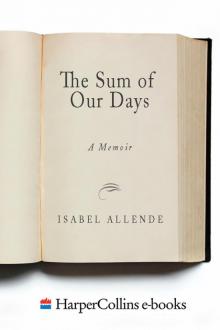 The Sum of Our Days
The Sum of Our Days